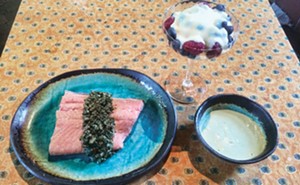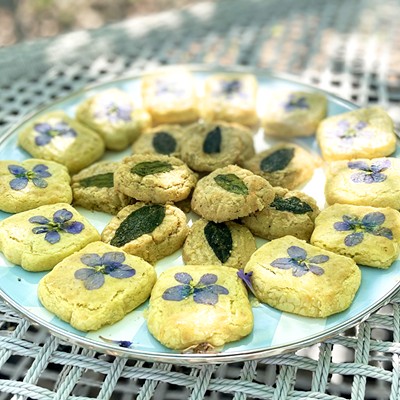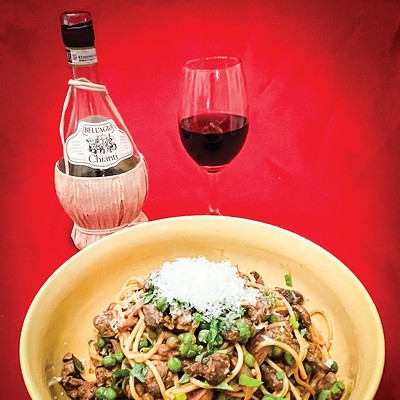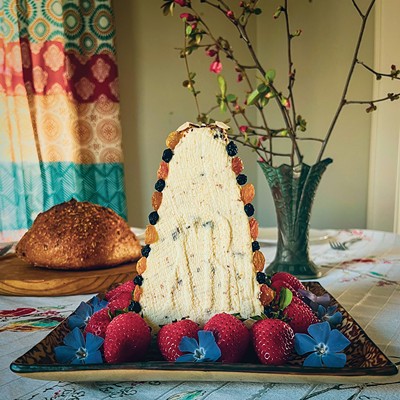
Summer is a time for sauces that are fresh and light and don’t require lots of time standing over a hot stove. (I’m designating BBQ sauce as a separate category.) The first four recipes call only for chopping and measuring; the fifth requires a blender or food processor; the last brief gentle cooking.
Salsa Verde is an Italian classic, used with grilled or roasted meats, fish and vegetables. The next two recipes are Salsa Verde riffs that have become classics on their own: a mint variation perfect with lamb and fish, and Chimichurri, a South American interpretation that probably was created by Argentina’s large Italian population.
Salsa Verde
• 2 cups packed cup parsley, preferably flat-leaf
• 1/2 cup packed cup basil
• 2/3 cup capers, drained
• 2 large oil-packed anchovy fillets, drained and chopped, optional
• 1 garlic clove, chopped
• 1 tablespoon Dijon mustard
• 1 teaspoon sugar
• 1/4 cup extra-virgin olive oil
• Salt and freshly ground black pepper
Mint Salsa Verde
• 1 cup loosely packed mint leaves
• 1/3 cup loosely packed fresh parsley leaves
• 2 tablespoons chopped fresh tarragon
• 1 tablespoon capers, preferably salt capers, soaked in warm water and drained
• 3 anchovy filets, packed in olive oil
• 1 teaspoon minced garlic, or more or less to taste
• 1/3 cup extra-virgin olive oil
• Ground hot pepper OR hot pepper flakes to taste, optional
• Freshly ground black pepper to taste
• Fresh lemon juice to taste
• Salt to taste, if necessary
Finely mince together the fresh herbs, capers, anchovies and garlic. This can be done in a food processor, but mincing by hand results in a better texture, one that’s not overly homogenized. Stir in the remaining ingredients. You may or may not need to add salt, depending on the salinity of the capers and anchovies. Do not taste for salt until everything else has been combined.
Optional: Coarsely grate one or two hard-boiled eggs into the salsa
Chimichurri sauce
• 4 cups loosely packed flat-leaf (Italian) parsley
• 2 tablespoons coarsely chopped garlic, or more or less to taste
• 4 small scallions, chopped
• 1 medium carrot, coarsely grated
• 1/3 cup red or white wine vinegar, plus additional if desired
• 1 stalk celery, coarsely diced
• 1 jalapeno pepper, stemmed but not seeded, chopped, or substitute hot pepper flakes, optional
• 6 tablespoons water
• 1 teaspoon salt, plus additional if needed
• 1 teaspoon freshly ground pepper, or more or less to taste
• 1 cup extra-virgin olive oil
• Pinch of sugar, optional
Place all the ingredients in the container of an electric blender or food processor except the oil and blend until all the ingredients are combined. Add the oil in a stream and process until the mixture is thoroughly mixed, but stop before it becomes completely puréed. Season to taste with additional salt, pepper, vinegar and a little sugar if needed. Let stand at least an hour before serving. Chimichurri will keep for at least a couple of weeks in the refrigerator.
Greece may be in chaos, but you can experience some of its sunny flavors with this simple marinade and dressing. OPAA!!
Greek marinade for chicken, fish or shrimp
• 2 cups dry white wine
• 1/2 cup fresh lemon juice
• 1 tablespoon dried oregano
• 1 cup finely chopped onion, not super-sweet – about 1 medium
• 1 teaspoon minced garlic, or to taste, optional
• 2 tablespoons kosher salt, optional
• 1 teaspoon freshly ground pepper, or to taste
• Extra-virgin olive oil
• Chopped fresh parsley, preferably flat-leaf, and/or fresh mint for garnish, optional
Combine all ingredients except the olive oil and fresh herbs in a large resealable plastic bag, close the bag, and squish to combine. Add the chicken or fish, eliminate as much air as possible from the bag, and seal.
To use with chicken: Marinate chicken at least four hours and preferably overnight, refrigerated. An hour before serving, remove the chicken, pat dry and let stand, skin side up, to dry the skin and come to room temperature. Brush lightly with the olive oil, and grill, roast or broil until the juices run clear. Sprinkle with the fresh herbs before serving if desired. Makes enough marinade for one chicken, whole or cut up, or up to three pounds of chicken pieces.
To use with fish or shrimp: Choose firm fish suitable for grilling. Use very large shrimp, peeled or not, as you choose. Marinate for at least 1/2 hour, but no more than an hour, turning occasionally. Unpeeled shrimp should marinate for the full hour. If marinating for a half hour, don’t refrigerate; if marinating for an hour, refrigerate for 1/2 hour, then let stand the remaining time at room temperature. Remove from the marinade and pat dry. Brush lightly with olive oil. Grill, broil, or roast to your desired degree of doneness, then sprinkle with the fresh herbs if desired. Make enough marinade for up to 2-3 lbs. fish or shrimp.
For Greek dressing or dipping sauce: eliminate the wine, reduce the onion to 2 tablespoons and combine with the remaining ingredients and 1 cup olive oil.
When garlic scapes are tender and green, I always make at least one batch of this delectable aioli to use as a dipping sauce, salad dressing base or condiment.
Garlic Scape Aioli
• 1 large free-range egg
• 1/3 cup minced tender parts of garlic scapes
• 1 teaspoon salt
• 1 teaspoon sugar
• 1 tablespoon minced pickled jalepeños, optional
• 1/2 cup canola or other vegetable oil
• 1/2 cup extra virgin olive oil
• 3 tablespoons seasoned rice wine vinegar
Place the egg, garlic, salt and jalepeños (if using) in the container of a food processor or blender. Process until the garlic and jalepeños are thoroughly puréed. Add the oil in a very thin stream, especially at first. Add the vinegar and check the seasoning. Let stand for at least an hour before serving. Makes about 1 1/2 cup
This very traditional French custard sauce’s elegant name translates as English cream (The English just call it custard sauce.) Its simplicity makes it the perfect topping for seasonal berries and other fresh fruit.
Crème Anglaise
• 1/2 whole vanilla bean, split in half lengthwise, preferred, OR 1 tablespoon pure vanilla
• 1/2 cup sugar
• 1 teaspoon cornstarch
• Pinch of salt
• 4 egg yolks
• 1 3/4 cups whole milk
Put the sugar in a medium bowl. With the tip of a small sharp knife scrape the sticky tiny seeds from the inside of the vanilla pod into the sugar, rubbing the knife tip in the sugar to dislodge them. When the pod is scraped clean, rub the mixture between your fingers until the vanilla seeds are no longer in clumps. Add the cornstarch and combine thoroughly. (Vanilla extract will be added later.)
Process the egg yolks and sugar mixture in the bowl of a food processor until the mixture is pale yellow and forms a ribbon when poured. Meanwhile, bring the milk to a simmer in a heavy nonreactive saucepan. With the food processor running, add the milk in a very thin stream to the egg/sugar mixture. If you add it too quickly the eggs will curdle. Reduce the heat to very low, return the mixture to the saucepan and place on the heat. Stir continuously with a whisk or spatula until the mixture has thickened just enough to coat a spoon well. Do not let the mixture simmer. Remove from the stove (and add the vanilla extract, if using) and stir until you are sure the mixture will not continue to cook from the pan’s heat. Can be kept, refrigerated, for at least a week.
Gingered Crème Anglaise
• 1 1/2 teaspoons freshly grated ginger, or ginger juice, available at Food Fantasies and some groceries.
If you are using grated ginger, add it to the milk.
Strain the mixture through a fine sieve after cooking. If you are using the ginger juice, straining is not needed; stir it into the mixture, then cool.
Contact Julianne Glatz at [email protected].














